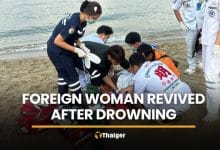Thailand News Today | Govt reveals treatment costs for Covid

Following the CCSA’s decision yesterday to lower the insurance coverage required of overseas arrivals, the health minister agrees the new figure is enough to cover Covid treatment, based on the latest findings.
Anutin Charnvirakul says figures from the National Health Security Office indicate that treatment costs for severe Covid cases are usually around 300,000 baht per person, which is less than 10,000 US dollars. So from March 1st, mandatory coverage for overseas arrivals will be reduced from 50,000 US dollars to 20,000.
At its meeting yesterday, the CCSA decided to cut the insurance requirements, as well as ditching the day 5 PCR test from March 1.
Currently, all overseas arrivals have to show a negative PCR result that was taken 72 hours before departure, take another PCR test on arrival and again on day 5 of their stay. Both tests in Thailand require a mandatory booking in a SHA Plus hotel, where guests must wait in their room on both days until they receive a negative result. Yeah, and they wondered why arrival numbers were low.
The second – day 5 – test has been widely seen as a significant deterrent for would-be tourists, with tourism operators demanding all PCR testing be dropped. The government has partially conceded, and from March 1, the day 5 test will be replaced with a self-administered antigen test.
However, the requirements for a negative PCR test 72 hours before departure, plus the PCR test on arrival, still remain, as does the Thailand Pass process.
Anutin says antigen testing is an effective screening mechanism and points out that the vast majority of infections in Thailand are cases of local transmission anyway. He has repeated his call for everyone to get vaccinated and avoid high-risk activities in order to beat the latest wave of the virus.
—–
Thailand is currently developing 4 different Covid-19 vaccines, which could be ready for public use next year. The CCSA was briefed on the progress of each vaccine at its meeting yesterday.
Chula-Cov19 is an mRNA vaccine being developed by a team at Chulalongkorn University and has received over 2.7 billion baht in funding from the Thai government.
Currently, in phase 2 trials, immunity has been reported as 2.5 times higher when compared to natural immunity or to 2 doses of other vaccines. Researchers expect to begin phase 3 trials in August 2023.
Meanwhile, the inactivated vaccine HXP-GPOVac
is being developed by the Government Pharmacy Organisation and has received over 434.5 million baht in government funds. Clearly, it hasn’t spent that money towards thinking of a catchy name.
The vaccine is currently undergoing phase 2 trials, with 250 volunteers between the ages of 18 and 75 taking part.
HXP-GPOVac has been found to be safe and provides a good level of immunity. Phase 3 trials are expected to get underway in the third quarter of next year.
The third vaccine is being developed from a protein subunit of tobacco leaves and has received nearly 1.5 billion baht in government funding.
Baiya SARS-CoV-2 Vax has completed phase 1 testing on 48 volunteers between the ages of 18 and 60. The trials have shown it to be safe, but researchers at Chulalongkorn University say the level of immunity generated is not satisfactory.
They are now working on a second version in an attempt to increase immunity levels. If Baiya SARS-CoV-2 Vax does prove successful, it could be registered in quarter 3 or 4 of next year and would be the first plant-based vaccine in Asia.
The fourth vaccine being developed in the kingdom is a DNA vaccine administered by a jet injector. This is a device that replaces a needle by using a narrow stream of fluid to penetrate the skin and administer the vaccine. The Covigen vaccine has received 650 million baht in government funding and is still in phase 1 and 2 trials.
If successful, it’s expected to be registered next year and will be the first vaccine not administered via needle.
—-
After being delayed for decades, Thailand’s house of representatives unanimously passed a draft law that criminalises torture and forced disappearances.
The bill is now awaiting senate approval which could take place in May and could help parents and partners of missing Thai activists take legal action. Those convicted of political disappearances and torture cases involving death could be imprisoned between 15 and 30 years.
The United Nations estimates that there have been 82 enforced disappearances in Thailand since 1980, but experts say the real number could be higher than that.
One notorious forced disappearance in Thailand is that of activist Wanchalearm in 2020. Wanchalearm was an LGBT rights and pro-democracy activist. Once he gained publicity for his activism against the 2014 coup, he was called to attend a meeting at a military camp. He then fled to Cambodia.
In June 2020, Wanchalearm was kidnapped on the street in broad daylight. His sister was on the phone with him at the time and told the BBC about her last conversation with him.
In her statement, she said she heard a loud bang that sounded like วันเฉลิม had been in a car accident but then she heard him say ‘I can’t breathe, I can’t breathe’.
Human rights activists say authorities are often involved in cases like Wanchalearm’s, and the perpetrators are rarely brought to justice. A director at Amnesty International Thailand told reporters this draft law offers a “glimmer of hope” to grieving families of such victims.
———
A teenager staying in a community isolation centre while recovering from Covid says she was sexually assaulted by a young man staying in the same room, adding that there were no authorities monitoring the patients.
Many of Thailand’s field hospitals and isolation centres have numerous beds made from cardboard boxes all in one large room such as a gymnasium. The 15-year old says she was staying in a coed isolation room in the central province of Ang Thong when a new patient, an 18-year-old man, started making sexual comments.
Reports say the man would follow her around the room and went to her bed, touching her. At one point, he followed her to the bathroom where the teen says he attempted to rape her. The teenager had been admitted to the isolation centre with around 10 of her friends who had also tested positive and they were reportedly able to stop the man from assaulting her.
Reports in Thai media say there were no authorities in the room when the assaults took place. Patients could contact the authorities on the messaging application Line, but apparently, they would reply late.
The teenager says she tried to contact authorities when she had a stomachache and she didn’t get a response until two days later.
After getting out of treatment, the teenager and her family already reported to the officers at Ang Thong Provincial Police Station and the Dhamrongdham Centre under the Ministry of Interior.
——–
Terrible month for Thai beaches, as authorities are now investigating an oil tanker after waste was found floating near an island off the coast of Chon Buri’s Sattahip district.
Yesterday, the Royal Thai Navy’s corvette reported a waste spill about 9 kilometres away from the island and said it spread across a large area of the Gulf of Thailand. The navy deployed a helicopter to track the spill route and found that the waste was coming from an oil tanker named SMOOTH SEA. The tanker headed to another island called E Lao and later docked at Sichang Island.
The Maritime Enforcement Command Centre authorities are investigating to determine if the waste was leaked from the tanker. The centre shared that the updates on the situation will be released soon.
A Royal Thai Navy Spokesperson says the tanker operators could be charged for violating the Thailand sailing act if authorities found evidence of spreading waste into the sea. Suspects could face jail for up to three years and a fine of up to 60,000 baht. The tanker would also have to pay compensation for cleanup efforts and nature rehabilitation.
Latest Thailand News
Follow The Thaiger on Google News:


























